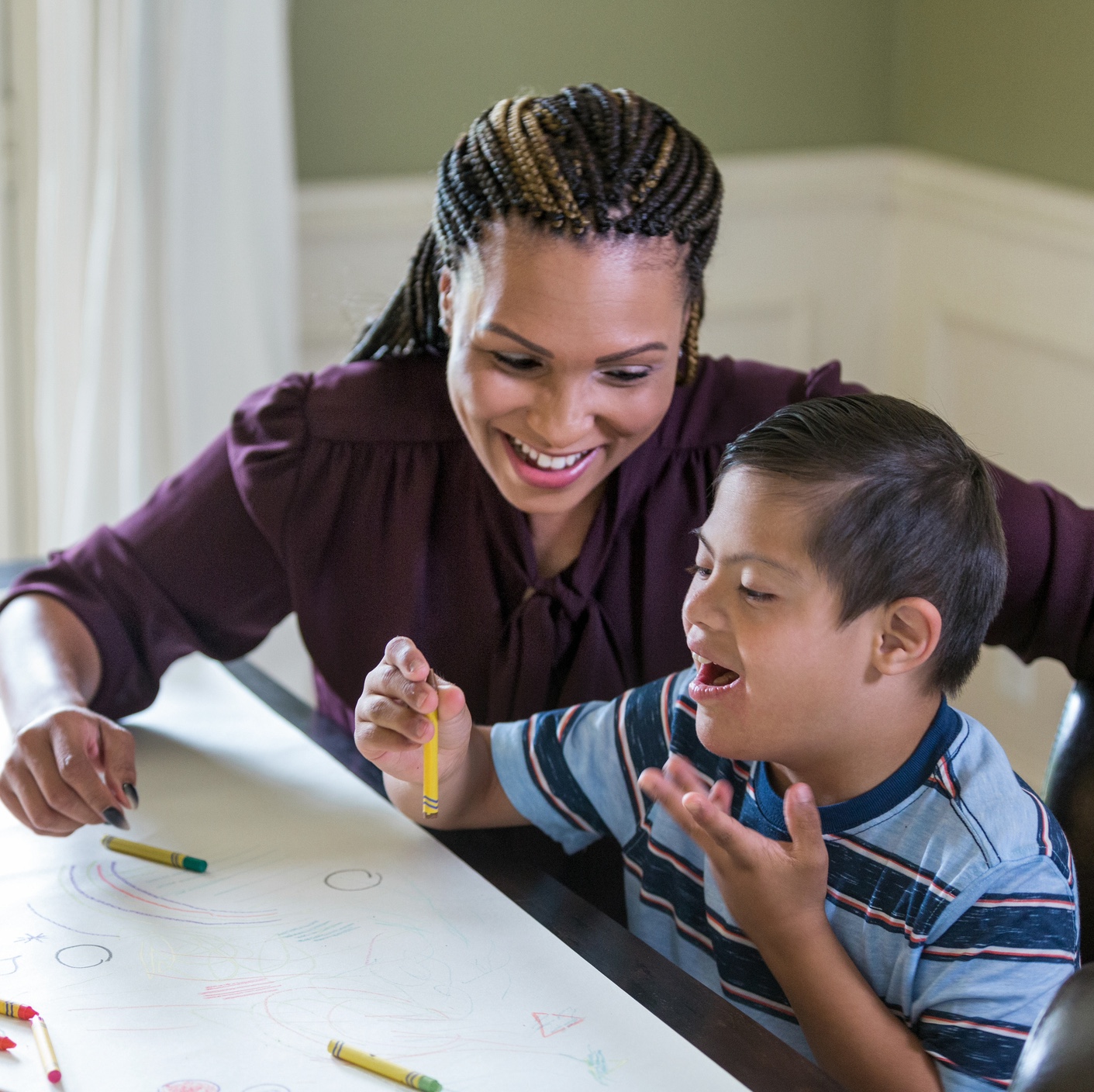How did you come to your role at Cornerstones of Care? What kind of positions did you hold prior to joining the team?
One of my first jobs after graduate school was as a social worker in the emergency room of a psychiatric facility. Then, when I worked in municipal government, I was a liaison between neighborhood associations and the city. It was a lot of educating and working with home associations. Most recently, I managed a volunteer program where I worked with older adults and placed them in schools and daycares to volunteer with children.
I view myself as a problem-solver. I’ve always had jobs where I was solving problems.
I chose to apply to Cornerstones of Care because I was inspired by working with other foster parents and listening to their stories.
What is treatment foster care, and what is your role in this important work?
Treatment Foster Care is a program designed to provide an extra level of support to foster parents who have the commitment and have taken extra training to work with kids in care. These kids come from a background that includes a significant amount of trauma. We’re providing coaching and training opportunities to assist the foster parents in being successful with that child in their home, moving them toward permanency.
I started as a Treatment Foster Care Specialist. Now, I am the Treatment Foster Care Manager. The biggest part of my role is building relationships. It’s all about building solid relationships with the TFC staff, TFC resource providers, and our foster parents.
I help to bridge those relationships that the youth have with the foster parents in the home and provide education and coaching to team members and foster parents.
What qualifies a child to be in Treatment Foster Care vs. Traditional Foster Care? What kinds of behaviors can parents expect?
Treatment Foster Care is a level of service.
One of the ways that I describe this is by using but/for language. In a former job we used but/for as a form of measurement for the need of the service. Measuring if the service didn’t exist, then something else would happen. But for this level of service [TFC], then this kiddo would likely end up in residential care. Treatment Foster Care is put into place to avoid putting them into a residential placement.
TFC will see a wide variety of children and adolescents, usually those with significant emotional, behavioral, or social issues or medical needs.
This is a hard question for me because you don’t want to put an emphasis on the surface behaviors. This work is really about addressing the trauma underneath, not focusing on the behaviors.
In foster care case management, they meet as a team to determine if a child meets the need for TFC services. They are looking at behaviors, the conditions, and all of that. The foster family may have several disruptions in a traditional placement and may not have the extra training to deal with those behaviors.
In a traditional home, you don’t normally have foster parents with that additional level of training. They are seeing kids without all those extreme behaviors. The child may come in and gel with the family. Getting them to come to dinner or watch TV is not a struggle, or they can play by themselves.
When you have a kid who comes from a history of trauma, that can look really different.
What is the Virtual TFC Speakers/Educational Series? What other new things do you hope to bring to treatment foster care parents?
The TFC Speaker Series is something new that I brought to the organization. Last night, we had someone from MOCSA (Metropolitan Organization to Counter Sexual Assault) talk about their services, and it was very informative. There were 18 participants.
 I want to change the face of how we educate and train our TFC homes. I want it to be more interactive. I want the training to be ongoing instead of just reaching a certain point and having to get hours in. I want it to be intentional and have a purpose.
I want to change the face of how we educate and train our TFC homes. I want it to be more interactive. I want the training to be ongoing instead of just reaching a certain point and having to get hours in. I want it to be intentional and have a purpose.
The TFC Speaker Series is one of my ideas. I’m also hoping to have watch parties. I have a foster parent who did some brain mapping, and they told him that the kiddo was having these problem behaviors because he was trying to find a sense of safety in his environment. I said, “Oh yeah, that’s interoception and polyvagal theory.”
I thought, why don’t we host a watch party? We can share videos, and people can comment about what they’ve experienced and what they’re seeing.
I also want to have referral reviews where foster parents log in, and we review the behavior symptoms or surface behaviors and how we’ve addressed these behaviors in the past. To me, that’s a modified support group.
Those are three new ways of training that I’m planning and want to get off the ground. So far, we just have the speaker series, and it’s coming off exactly the way I envisioned it.
What are the incentives available to those considering TFC?
The monthly maintenance is a higher rate for TFC. It’s always been higher than traditional foster care. It’s higher because we know that foster parents dealing with children coming from trauma will generally have more appointments, more meetings, and more time-related obligations.
The incentives are part of a 2024 recruitment effort. If your foster home license is with Cornerstones of Care and you are an approved TFC provider, you qualify for those incentives.
Tell us about a treatment foster care parent who went above and beyond for the kid(s) in their care. What qualities did they have that make for a good TFC parent?
I was just going through something with this couple, and she was really inspiring. It made me think, “I want to be a foster parent so I can be just like her.”
The couple really wanted to meet this kid, and they drove all the way to Springfield to meet him – he was a young child. They get there, and after five minutes, the kid says, “I’m done. I don’t want to talk to you anymore.” But they’re sticking with it and going back to try to meet with him again and see if he’s a good fit for the home.
One of the reasons she told me was she thinks he just deserves a chance.
Important qualities are patience, picking and choosing your battles, and just hoping for a better tomorrow – instilling hope in the child that things can get better.
What’s your pitch? Why do you think people should choose to become treatment foster parents?
When talking to people about why they should join TFC, I often reference a quote from Dr. Bruce Perry, a child psychiatrist, about how healthy relationships can help children heal from trauma. Below is a paraphrased version of how I might communicate this to prospective foster parents.
When you look around and tune into some of the issues plaguing our communities and some of the issues involving our youth, many are experiencing some form of trauma. It has been said that all it takes is one healthy relationship to lead to a better future for that child. That holds more truth for children in out-of-home care because of the losses that they have endured. That brighter future creates hope for all of us.
Let the TFC program be one of the tools that you use to instill hope in generations.
I’ve heard that you have a master’s in social work degree. What other ways have you considered using your degree to support children and families?
I’m an LMSW. I graduated from KU in 1995, so I’ve been at this for a long time. I’ve always been involved in macro-social work, working with neighborhoods and communities.
At this point in my life, the micro work fits me better just because of the emphasis I’m putting on building relationships. That’s the answer to a lot of the problems we’re seeing now. People can be so mean to each other. I have a hard time with that.
I’ve thought about becoming a licensed clinical social worker and doing therapy. I’m driven each time I see statistics that say that the mental health needs of kids are not being addressed and that they’re not receiving the services they need – and with minority populations also.
A year after I got to Cornerstones of Care, I enrolled in the play therapy post-graduate class at Mid-America Nazarene. I’m a big proponent of play therapy. Toys are the words that kids use in play therapy.
When I was a TFC Specialist, I used a lot of play therapy techniques, and even now, I encourage our TFC Specialists to use play therapy techniques to build rapport and get to know the kiddos.
The main thing is building that rapport and establishing trust. It’s all about the relationship.



